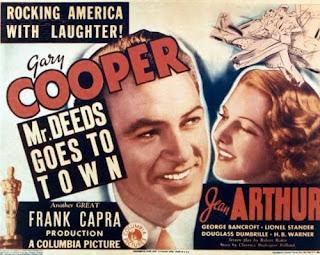
Frank Capra and the everyman: a winning combination!
Whether portrayed by Jimmy Stewart (Mr. Smith Goes to Washington, It’s a Wonderful Life), Clark Gable (It Happened One Night), or Gary Cooper, the star of 1936’s Mr. Deeds Goes to Town, Capra’s “common man” always found their way into an audience’s heart, resulting in some of the finest, most uplifting movies of the 1930s and ‘40s.
After inheriting $20 million dollars from his late uncle, Longfellow Deeds (Cooper) leaves the small town of Mandrake Falls, Vermont behind, taking up residence in a spacious New York City mansion.
Considered by everyone to be little more than a backward yokel when he first arrived, Deeds eventually outwits con men, opportunists, art enthusiasts, bankers, and everyone else who wants a piece of his fortune. It seems the only person he can actually trust is his new flame, Mary Dawson (Jean Arthur).
But what Deeds doesn’t know is Mary is actually “Babe” Bennett, one of the city’s most ruthless reporters, who will stop at nothing to get the inside scoop on Longfellow Deeds. That is, until the moment she starts falling in love with him.
“Mr. Deeds Goes to Town was the first film I made in which I consciously tried to make a social statement”, Capra once told Richard Schickel. “I wanted to see what an honest, small-town man would do with $20 million - how he would handle it, and how he could handle all the predators that would surround him, and what good would come out of that thing, what statements you could make about a man being his brother’s keeper”.
Cooper is positively endearing as Longfellow Deeds, a man who enjoys playing his Tuba whenever the mood strikes him, and who rushes to the window to watch fire engines as they roar down the street. Though a man of simple pleasures. Deeds is no pushover. In an effort to convince him to make up a $180,000 loss, the New York Opera names Deeds their chairman, only to be put in their place when he starts asking questions, wondering what they’re doing wrong to be losing money, and refusing to subsidize the Opera until he looks into it further.
On the flip side, Deeds is quick to help those less fortunate than himself, and late in the film is willing to give away large chunks of his money to the poor and needy. It’s a move that causes greedy lawyer John Cedar (Douglass Dumbrille) to try and have Deeds declared mentally incompetent, so that he can seize control of his fortune.
Still, despite the occasional setback, the values that Longfellow Deeds holds firm to remain intact, and anytime someone tries to make a fool of him, or laugh at his small-town mentality, he’s usually one step ahead of them. Even Babe Bennett, who took the assignment of cozying up to Deeds when her editor promised her a month’s paid vacation, eventually sees his inherent goodness, and comes to regret the role she’s playing in turning his New York “adventure” into a nightmare; neither Deeds nor his assigned protector Cornelius Cobb (Lionel Stander) can figure out how his nightly exploits make the front page of the next day’s newspapers.
The character of Longfellow Deeds, bolstered by Cooper’s heartfelt, sometimes understated performance, gives Mr. Deeds Goes to Town a hell of a lot of heart. This is a movie that will have you smiling ear-to-ear!
Rating: 9.5 out of 10
